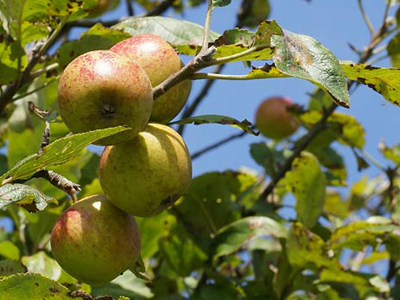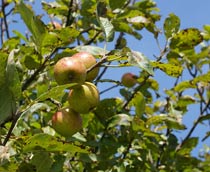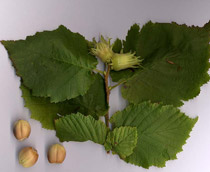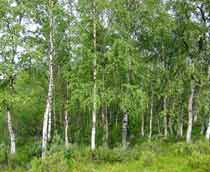
The fruit from this tree is sour, but can be made into a tasty jelly.
Plants - British Trees
Trees are a major part of the natural world. There are very few places on earth where trees do not thrive. We use trees in our gardens for pleasure and in our orchards for fruit. And of course, we use wood as a building material. Generally speaking, tree are very hardy plants that are able to withstand a huge amount of damage without dying.
Can you tell a Hazel from a Beech from an Alder? Find out in the following quiz. Please click on the photos to get a more detailed picture.
1 .
Can you identify this British tree?
Rowan
Yew
Holly
Black Poplar
- Order: Rosales
- Family: Rosaceae
- Genus: Sorbus
- Species: S. aucuparia
- It can grow at altitudes of 1,000 metres above sea level, the highest of our trees.
- Berries are yellow to begin with, then ripen to a bright red colour.
- The name derives from a Norse word meaning a charm. It was often planted outside houses to ward off witches.
2 .
Can you identify this British tree?
Silver Birch
Alder
Common Beech
Black Poplar
- Order: Fagales
- Family: Fagaceae
- Genus: Fagus
- Species: F. sylvatica
- A tall tree with a straight trunk.
- It prefers lime-rich soils.
- Because it can be turned easily, this tree's wood is perfect for making chairs.
- Chairmakers used to be known as 'bodgers' in the Chilterns.
3 .
Can you identify this British tree?
Common Hawthorn
Field Maple
Alder
Oak
- Order: Fagales
- Family: Betulaceae
- Genus: Alnus
- Species: A. glutinosa
- A deciduous tree which grows along streams and in marshland.
- This tree has a rough bark.
- The charcoal from this species was used for gunpowder until the 1940s.
- Clogs and toys are made from its wood.
4 .
Can you identify this British tree?
Ash
Yew
Rowan
Field Maple
- Order: Lamiales
- Family: Oleaceae
- Genus: Fraxinus
- Species: F. excelsior
- Its preferred habitat is woods and hedgerows.
- Grows well on lime-rich and heavy soils.
- Has a single trunk and can grow up to 40 metres.
- Its wood is tough and is used to make oars, hockey sticks and skis among other things.
5 .
Can you identify this British tree?
Common Beech
Holly
Yew
Wych Elm
- Order: Aquifoliales
- Family: Aquifoliaceae
- Genus: Ilex
- Species: I. aquifolium
- A very popular Christmas decoration.
- The leaves are hairless, prickly and dark green.
- Only the females produce the bright red berries.
- These berries are poisonous to humans if eaten, but birds love them!
6 .
Can you identify this British tree?
Yew
White Willow
Ash
Oak
- Order: Pinales
- Family: Taxaceae
- Genus: Taxus
- Species: T. baccata
- An evergreen tree with a bulbous and somewhat split trunk.
- The bark, cut foliage and seeds are poisonous.
- Studies of this tree found in churchyards reveal that some could well be over 4,000 years old!
7 .
Can you identify this British tree?
Sycamore
Holly
Wych Elm
Crab Apple
- Order: Rosales
- Family: Rosaceae
- Genus: Malus
- Species: M. sylvestris
- This tree's flowers are a delicate pale pink to white colour.
- Does not grow on acid soil.
- The fruit is sour, but can be made into a tasty jelly.
- It rarely grows higher than 8 metres.
8 .
Can you identify this British tree?
Common Beech
White Willow
Oak
Common Hawthorn
- Order: Malpighiales
- Family: Salicaceae
- Genus: Salix
- Species: S. alba
- A beautiful and widespread tree, often seen by streams and rivers.
- The wood is used for fences and baskets, however it is mostly well-known for its use as cricket bats.
- The bark tends to be grey-brown with deep fissures.
9 .
Can you identify this British tree?
Common Hawthorn
Field Maple
Common Hazel
Ash
- Order: Fagales
- Family: Betulaceae
- Genus: Corylus
- Species: C. avellana
- Flowers appear before the leaves between the months of January to April.
- Male flowers are catkins.
- The nuts are a food source for squirrels, mice and birds.
- The wood can be used for thatching.
10 .
Can you identify this British tree?
Sycamore
Crab Apple
Ash
Silver Birch
- Order: Fagales
- Family: Betulaceae
- Genus: Betula
- Species: B. pendula
- Makes an attractive garden tree.
- Has a white bark with diamond-shaped black marks.
- A valuable tree for wildlife as it supports over 200 species of insect.
- The twigs are used for making brooms and jumps for horse racecourses.
**Unlimited Quizzes Await You! 🚀**
Hey there, quiz champ! 🌟 You've already tackled today's free questions.
Ready for more?
Ready for more?
🔓 Unlock UNLIMITED Quizzes and challenge yourself every day. But that's
not all...
not all...
🔥 As a Subscriber you can join our thrilling "Daily Streak" against other
quizzers. Try to win a coveted spot on our Hall of Fame Page.
quizzers. Try to win a coveted spot on our Hall of Fame Page.
Don't miss out! Join us now and keep the fun rolling. 🎉
**Unlimited Quizzes Await You! 🚀**
Hey there, quiz champ! 🌟 You've already tackled today's free questions. Ready for more?
🔓 Unlock UNLIMITED Quizzes and challenge yourself every day. But that's not all...
🔥 As a Subscriber you can join our thrilling "Daily Streak" against other quizzers. Try to win a coveted spot on our Hall of Fame Page.
Don't miss out! Join us now and keep the fun rolling. 🎉

















